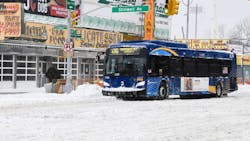Transit Tech Lab expands pilot programs with New York area transit agencies to improve transit access and experience
The 13 companies who were selected by the Transit Tech Lab (TTL) to participate in last year’s TTL challenges program will continue to work with the lab’s regional transportation agency partners in larger-scale pilots. The TTL will challenge these companies to demonstrate how their technology can improve transportation accessibility and deliver essential services more effectively. TTL notes these companies were initially chosen from 150 global applicants to conduct a minimally viable proof of concept (POC) that addressed a top priority for one or more of the agency partners.
The TTL says it gives public agencies exposure to innovative technology and new ways of working on an expedited basis. Entrepreneurs gain exposure to New York City’s public agencies, mentors and investors and an opportunity to demonstrate their solutions at scale.
The 13 companies set out to use their technology — ranging from artificial intelligence, robotics and LiDAR to address the 2024 TTL challenges:
- Improving customer experience by better communicating service changes, reducing delays and augmenting safety and cleanliness initiatives
- Building a more resilient and adaptive transit system
- Maximizing the city’s curb space to serve the multiple and varied needs of New Yorkers.
During the pilot, participating companies will demonstrate how the company’s technologies can scale with the TTL’s agency partners, which include the Metropolitan Transportation Authority (MTA), New Jersey Transit (NJ Transit), New York City Department of Transportation (NYC DOT) and the Port Authority of New York and New Jersey (PANYNJ).
Customer Experience Challenge
BusPas (Montreal, Québec) in partnership with NJ Transit: During its proof-of-concept, Buspas integrated NJ Transit real time bus schedules (GTFS-RT feeds) at the West Bradford Avenue bus stop outside NJ Transit Headquarters. In addition, the company developed a pilot scope outlining how the company’s smart bus stop can improve bus service planning and customer experience at six locations.
Convo Communications (Austin, Texas) in partnership with MTA, NJ Transit, PANYNJ: During its proof-of-concept, Convo Communications installed QR codes to enable real-time ASL translation for deaf customers at multiple MTA and PANYNJ locations.
GoodMaps (Louisville, Ky.) in partnership with NJ Transit and PANYNJ: During its proof-of-concept, GoodMaps completed a LiDAR scan of the Hoboken Terminal, which is shared by the PATH, NJ Transit and New York Waterway to support the development of a customized, accessible indoor navigation tool in the GoodMaps app. In addition, the company delivered point cloud imagery and an initial CAD drawing of Hoboken Station.
Urban Solar Inc. (Beaverton, Ore.) in partnership with NJ Transit, NYC DOT: During its proof-of-concept, Urban Solar partnered with NYC DOT and NJ Transit to demonstrate how its battery-powered bus signs can provide real-time information at two bus stops and the company integrated real time bus schedules (GTFS RT data feeds) from 16,000 NJ Transit and 14,000 NYC DOT bus stops.
Velocia (Toronto, Ontario) in partnership with PANYNJ: During its proof-of-concept, Velocia worked with the PANYNJ to establish a trucker ambassador program and worked with New York City Transit (NYC Transit) to simulate how its survey and rewards platform could change behaviors among employees and riders.
Resilience Challenge
Cascara Energy (Toronto, Ontario) in partnership with MTA: During its proof-of-concept, Cascara modeled 12 technical scenarios and performed an economic analysis of its cooling solution at the MTA's Third Avenue Subway Station on the L Line. Its analysis found that they could theoretically reduce platform temperatures at the Brooklyn Third Avenue Subway Station and sell $171,000 worth of recovered heat annually.
CloudMonitoring/REMS Plus LLC (Queens, N.Y.) in partnership with MTA: During its proof-of-concept, CloudMonitoring installed 16 sensors across 12 locations within NYC Transit Long Island Rail Road (LIRR) and Metro-North Railroad facilities to deliver comprehensive analytics on temperature, humidity and water intrusion.
FLX Solutions (Bethlehem, Pa.) in partnership with MTA: FLX Solutions worked with 28 MTA and NJ Transit employees to understand which maintenance tasks the FLX BOT is best suited to augment. After shadowing 13 tasks across eight different locations, the team identified two use cases where the FLX Bot could have the strongest ROI: aiding in track-adjacent maintenance work and replacing ladders.
Intelligent Security Systems (ISS) (Woodbridge, N.J.) in partnership with PANYNJ: ISS worked with the PANYNJ to demonstrate how its under-vehicle inspection tool (UVSS) could improve the current security checkpoint process for cars entering the World Trade Center.
QEA Tech (Markham, Ontario) in partnership with PANYNJ: QEA Tech worked with the PANYNJ and the MTA to conduct a building envelope energy audit of the PANYNJ’s Holland Tunnel Admin Building and LIRR’s Garden City Facility.
